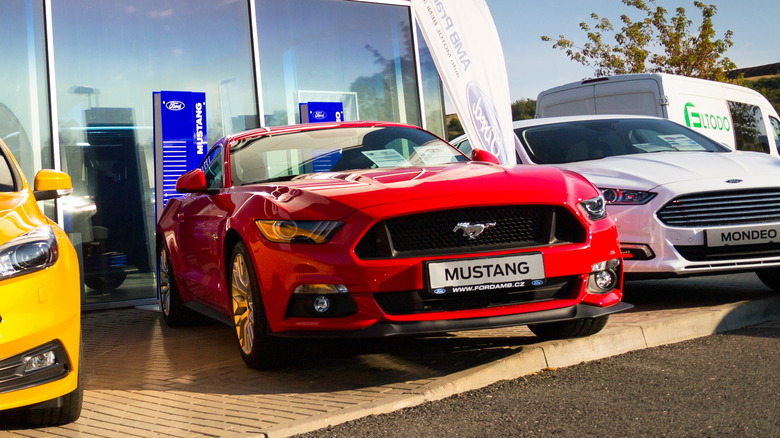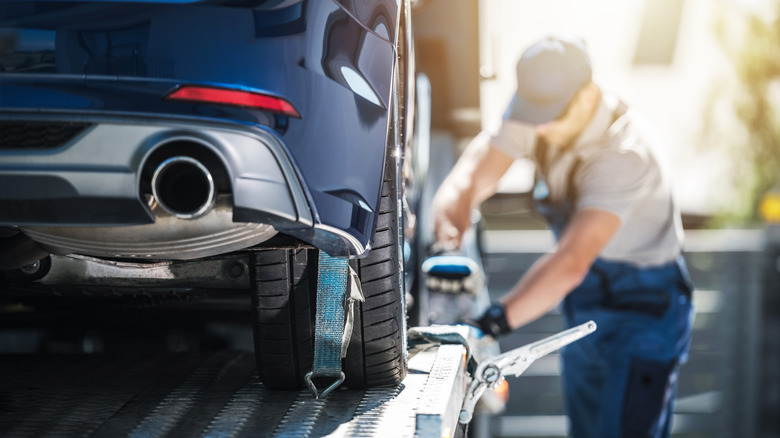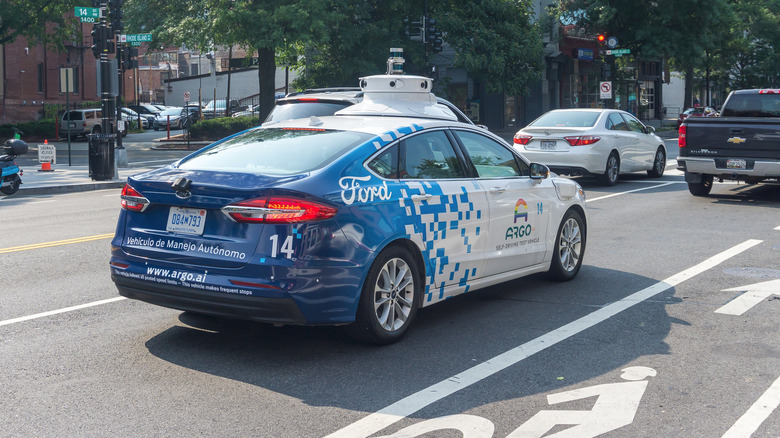Future Ford EVs May Drive Themselves Back To The Dealership If You Miss A Payment
Dystopian tech is everywhere. The police have killer robots, intelligent people are getting weirdly attached to AI, and "Ready Player One" is beginning to look like a documentary. Not wanting to be left behind, Ford is attempting to patent some incredibly dystopian-sounding vehicle technology. The Detroit-based manufacturer has filed a 14-page patent application which contains some pretty extreme ideas.
The patent document talks about how the tech — which may only exist as an idea at this time — could alter repossession proceedings. For the most part, the legal side of things would be the same. The person leasing the vehicle would receive a default payment notice if a payment is missed and a notice stating the lending agency intends to repossess the vehicle if the payment schedule isn't brought up to date within a certain timeframe. Ford's patent application states that self-driving software would change things after that point.
There are several consequences that could come from this
The car company argues that repossessions often lead to conflict, as many people don't want to have their cars taken away. If the vehicle just drives off, it will remove that potential for conflict. Even cars without full self-driving software aren't safe. Under the patent's plans, your vehicle would still be able to drive itself a short distance if that would make towing it away any easier. If you do have a self-driving car, expect it to disappear back to a dealership — or, if it's an older car, a junkyard. Because it's the principle of the matter or something.
Smarter owners may think about locking their soon-to-be robot-repoed car in a garage or taking its wheels off so it can't escape. Well, Ford is one step ahead, at least based on the patent documents. In these cases, your car will call the police on you like a large rodent with a V8 engine up front. Repossession isn't the only remote punishment Ford has suggested could entice people to pay their car loans on time.
Less severe options involve disabling the car's features, such as its air conditioning, GPS, or radio. There's also a point where you may start to believe Ford is currently staffed by the people who wrote the CIA's torture handbook. Anyone who owns a car built in the last couple of decades will be aware of the irritating noise that blares at you if you drive more than two yards without your seatbelt securely buckled. Imagine a noise that is equally irritating and will not stop until you pay up. That's what you'll get if Ford gets its way.
The one thing Ford won't do is hinder your ability to pay up
On the whole sliding scale of increasingly horrible ideas sits the car's ability to lock its financially delinquent owner out. This seems like a simple concept: miss a payment and you can't use the thing the payment was for until the money is handed over. But Ford realizes a lot of people drive to work and if the customer loses their job, then the chance of the car payment being made decreases. In light of that, the vehicle would strategically unlock during commuting times so you could go and make enough money to pay off your car loan.
The patent also talks about lifting the lock during any potential emergencies — though if grandpa has a heart attack, explaining the situation to Ford's customer services before you can rush him to the hospital seems a touch inconvenient. If the patent is granted, the one thing it will do is give Ford plenty of options — assuming the automaker moves forward with such technologies.
The company could treat the sanctions listed in the documents as a kind of sliding scale that gradually issues worse punishments as time goes on. Alternatively, Ford could cherry-pick which ones to actually implement or even choose which processes to implement on a case-by-case basis. Miss a payment in a Florida summer? Enjoy having your air conditioner switched off and your electric windows locked!
Thankfully, we may never see this in the real world
If you're looking for a positive amongst all of this, it's that these ideas may never be implemented. The patent itself was filed around 18 months ago, and a decision on whether to grant it is yet to be made. Ford issued a statement to Gizmodo explaining that it will "submit patents on new inventions as a normal course of business but they aren't necessarily an indication of new business or product plans." Ford was also asked if it was actively developing anything in the patent, but declined to respond.
Companies suggest horrifically dystopian policies all of the time, but customers do have one thing going for them: nobody is forcing them to buy a Ford or any other manufacturer's vehicle. The automotive market is also one of the most saturated and competitive markets out there. The one thing that would really turn Ford away from policies and technologies like this is customers refusing to buy anything that has those technologies installed in it. Fuel economy, ride comfort, and raw horsepower are all desirable features. Self-repossession isn't, so avoid buying cars with that and you'll be okay.



